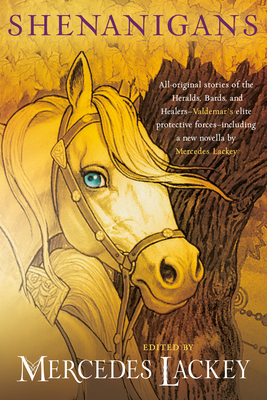 Shenanigans (Tales of Valdemar, #16) by Mercedes Lackey
Shenanigans (Tales of Valdemar, #16) by Mercedes Lackey Format: eARC
Source: supplied by publisher via NetGalley
Formats available: paperback, ebook
Genres: anthologies, epic fantasy, fantasy
Series: Tales of Valdemar #16, Valdemar (Publication order) #55
Pages: 336
Published by DAW Books on December 13, 2022
Purchasing Info: Author's Website, Publisher's Website, Amazon, Barnes & Noble, Kobo, Bookshop.org, Better World Books
Goodreads
This sixteenth anthology of short stories set in the beloved Valdemar universe features tales by debut and established authors and a brand-new story from Lackey herself.
The Heralds of Valdemar are the kingdom's ancient order of protectors. They are drawn from all across the land, from all walks of life, and at all ages--and all are Gifted with abilities beyond those of normal men and women. They are Mindspeakers, FarSeers, Empaths, ForeSeers, Firestarters, FarSpeakers, and more. These inborn talents--combined with training as emissaries, spies, judges, diplomats, scouts, counselors, warriors, and more--make them indispensable to their monarch and realm. Sought and Chosen by mysterious horse-like Companions, they are bonded for life to these telepathic, enigmatic creatures. The Heralds of Valdemar and their Companions ride circuit throughout the kingdom, protecting the peace and, when necessary, defending their land and monarch.
My Review:
 Last week’s Into the West – and Beyond before it – focused on the very serious adventure of the Founding of Valdemar. Kordas Valdemar and Company’s epic journey gave series fans a much better idea of just how much blood, sweat and tears went into the creation of the place that we all love. But that’s certainly not all there is to Valdemar.
Last week’s Into the West – and Beyond before it – focused on the very serious adventure of the Founding of Valdemar. Kordas Valdemar and Company’s epic journey gave series fans a much better idea of just how much blood, sweat and tears went into the creation of the place that we all love. But that’s certainly not all there is to Valdemar.
Shenanigans, the sixteenth book in the Tales of Valdemar subseries (after last year’s Boundaries), presents series readers with a treat of a present for this holiday season, as the stories within are exactly what the title names them – shenanigans.
While there’s a bit of derring-do, Shenanigans is a collection of marvelous, funny and often marvelously funny stories set in all the periods of Valdemar history among all of the many peoples and creatures that make the place so much fun to read about for so many glorious years.
In spite of the blurb, most of the stories in Shenanigans do not revolve around the Companions and their Chosen. Some do, of course, or it wouldn’t be a Valdemar collection, but quite a few of the shenanigans in the collection thereof are more slice of life stories, and there are a fair number that feature people with telepathic “gifts” that are not Chosen and may not even wish to be.
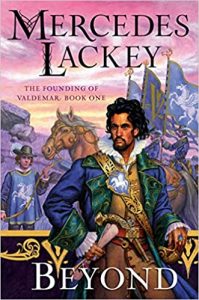 Of course, there are also several stories set among the students of the Collegium, because, well, students and pranking make for a fun story no matter what world they’re set in.
Of course, there are also several stories set among the students of the Collegium, because, well, students and pranking make for a fun story no matter what world they’re set in.
Which leads to my two favorite stories in the collection, “Pranks for the Memories” by Dee Shull and “Fool’s Week” by Anthea Sharp. The stories are similar, but they are still both excellent. It’s spring. The students are restless. (Probably every teacher everywhere is nodding their head at THAT idea). In “Pranks” one student mentions a family tradition of a week of pranking. In “Fool’s Week”, someone remembers that there used to be a traditional “fool’s week” at the Collegium until the practice, not unsurprisingly, got out of hand.
It’s suddenly in hand again, to the point where even the teachers are participating. And it’s hilarious!
The other standouts – at least for this reader – come in pairs. “All Around the Bell Tower” by Stephanie Shaver and “A Bouquet of Gifts, or The Culinary Adventures of Rork” by Michele Lang. Both are stories about young girls who have gifts that the people around them can’t quite identify – and that give them each more than a few problems. What each child needs is someone to both listen and understand. The story in “Bell Tower” is a bit more traditional Valdemar in that it’s her Companion that finally brings help in the persons of both themself and their accompanying Heralds. In “A Bouquet of Gifts” we get a much fuller than usual portrait of the helpful hertasi as Rork the chef, as he sets up a feast for a returning friend, also makes a new one – along with a menagerie of mischievously ‘helpful’ creatures and animals.
We saw a lot of the hertasi in Into the West and it’s lovely to see them again here.
And then there are the two stories that include both romance and adventure in equal measure – if on nearly opposite ends of the socioeconomic strata. “A Cry of Hounds” by Elisabeth Waters and “One Trick Pony” by Diana Paxson. “Hounds” is set in the King’s Court of Valdemar. Lord Repulsive’s father is dead, and Lord Repulsive himself is trying to marry off his 12-year-old stepdaughter. In reality, he’s selling his 12-year-old stepdaughter and trying to keep the King from finding out that the child is only 12. Because he will not approve the marriage once he learns, and he will not be amused when he discovers the deception. And he is not. Lord Repulsive gets what’s coming to him with the help of his castoff brother, his sister-in-law and every dog she talks to with her AnimalSpeech. And he deserves every bit of it. (Lord Repulsive really is repulsive. It’s not his real name but “if the shoe fits” or in this case, more like “if the Foo shits”…)
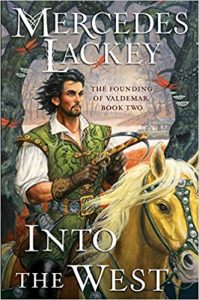 Last but not least there’s, Diana Paxson’s “One Trick Pony”, which mixes a bit of the bittersweet memory of heartbreak and the horrors of war into its story about a man who has found peace after grief and war by gardening, and the way that peace is invaded by a woman who reopens his heart and a newly born Companion who is learning the limits of their own power one prank at a time.
Last but not least there’s, Diana Paxson’s “One Trick Pony”, which mixes a bit of the bittersweet memory of heartbreak and the horrors of war into its story about a man who has found peace after grief and war by gardening, and the way that peace is invaded by a woman who reopens his heart and a newly born Companion who is learning the limits of their own power one prank at a time.
Escape Rating B: After the necessary seriousness of Into the West, the mostly lighthearted tales of Shenanigans were an absolute delight. As with most collections, not every single story hits its mark, but more than enough of them to make Shenanigans a treat for Valdemar fans. Certainly something to tide us all over as we wait for Gryphon in Light, coming in June.

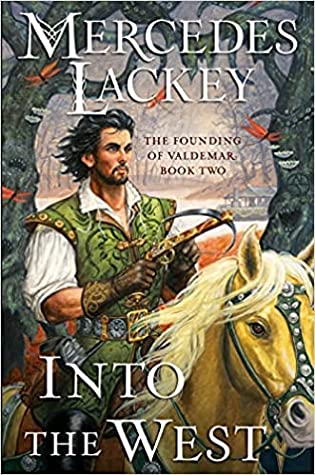 Into the West (The Founding of Valdemar, #2) by
Into the West (The Founding of Valdemar, #2) by  We already knew the destination. What Valdemar is, what it became, seemed fully formed all the way back in
We already knew the destination. What Valdemar is, what it became, seemed fully formed all the way back in 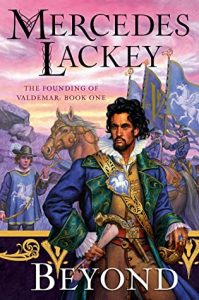 Escape Rating B: If you’ve read
Escape Rating B: If you’ve read  The one signature feature of the entire
The one signature feature of the entire 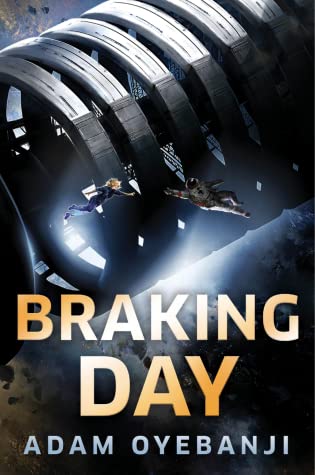 Braking Day by
Braking Day by 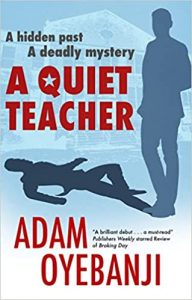 The question of whether the fleet will cripple itself, whether they and their old enemy will wipe each other out, or whether the cybernetic space dragons will decide that they are all collectively too stupid to live creates the kind of non-stop adventure that will keep readers on the edge of their seats even after the big, explosive climax.
The question of whether the fleet will cripple itself, whether they and their old enemy will wipe each other out, or whether the cybernetic space dragons will decide that they are all collectively too stupid to live creates the kind of non-stop adventure that will keep readers on the edge of their seats even after the big, explosive climax.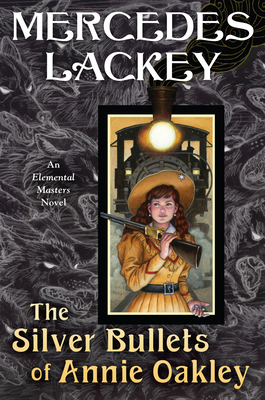 The Silver Bullets of Annie Oakley (Elemental Masters, #16) by
The Silver Bullets of Annie Oakley (Elemental Masters, #16) by 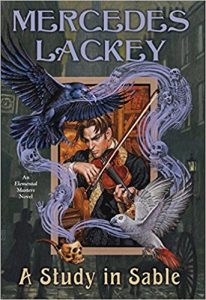 I stopped reading the
I stopped reading the  The Wolves – whose identity has never been conclusively determined – starved her, cheated her, threatened her and physically and mentally abused her at every turn for two years, beginning when Annie was nine years old.
The Wolves – whose identity has never been conclusively determined – starved her, cheated her, threatened her and physically and mentally abused her at every turn for two years, beginning when Annie was nine years old.
 Boundaries (Tales of Valdemar #15) by
Boundaries (Tales of Valdemar #15) by 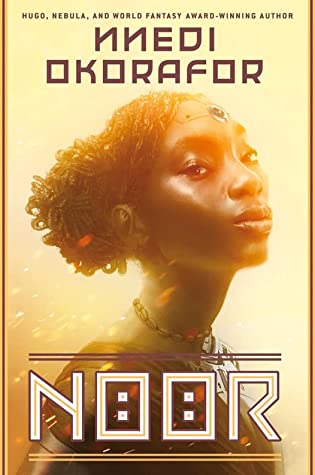 Noor by
Noor by 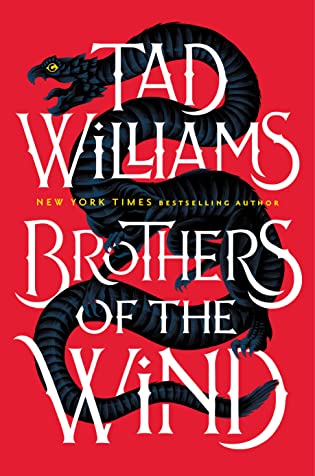 Brothers of the Wind by
Brothers of the Wind by 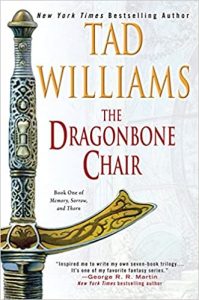 It’s hard to believe that
It’s hard to believe that 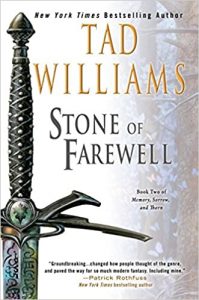 Escape Rating A-: More than anything else, Brothers of the Wind is a story about overweening pride going before a very big fall. And it’s a story about the difference between pride and honor. It’s also, playing into that pride, a story about the braying of privilege and the horrifying results of its exercise.
Escape Rating A-: More than anything else, Brothers of the Wind is a story about overweening pride going before a very big fall. And it’s a story about the difference between pride and honor. It’s also, playing into that pride, a story about the braying of privilege and the horrifying results of its exercise.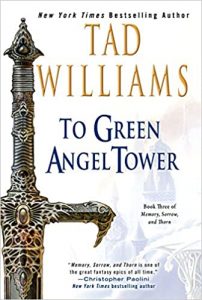 But this isn’t just the story of the two brothers, because the perspective of the story is told by Hakatri’s faithful servant, Pamon Kes. While Brothers of the Wind isn’t quite as epic as The Lord of the Rings, The Dragonbone Chair and the whole of Memory, Sorrow and Thorn definitely are. Which means that this book reads very much as if The Lord of the Rings had been written by Sam Gamgee entirely from his first-person perspective. A perspective that shows that even the compassionate, golden Hakatri took a tremendous amount of advantage of the goodwill and hero worship of an awful lot of people, whether his motives were pure or not.
But this isn’t just the story of the two brothers, because the perspective of the story is told by Hakatri’s faithful servant, Pamon Kes. While Brothers of the Wind isn’t quite as epic as The Lord of the Rings, The Dragonbone Chair and the whole of Memory, Sorrow and Thorn definitely are. Which means that this book reads very much as if The Lord of the Rings had been written by Sam Gamgee entirely from his first-person perspective. A perspective that shows that even the compassionate, golden Hakatri took a tremendous amount of advantage of the goodwill and hero worship of an awful lot of people, whether his motives were pure or not.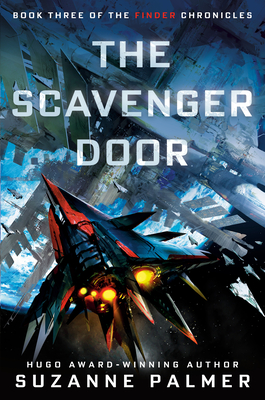 The Scavenger Door by
The Scavenger Door by 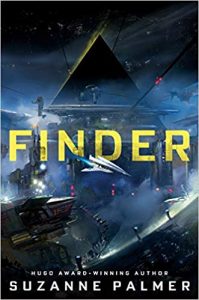 Surprisingly – honestly, extremely surprisingly – the basic premise of The Scavenger Door and the opening of last Friday’s book,
Surprisingly – honestly, extremely surprisingly – the basic premise of The Scavenger Door and the opening of last Friday’s book,  So don’t start here, because this book feels like the payoff for the whole thing. Start with Finder. Also, the audio for this entire series is wonderful. The narrator does a terrific job of conveying Fergus’ universe-weary voice, the entire story is told from Fergus’ first-person perspective. (That the narrator, when he is voicing Fergus’ internal dialog, sounds weirdly like Bill Kurtis from NPR’s
So don’t start here, because this book feels like the payoff for the whole thing. Start with Finder. Also, the audio for this entire series is wonderful. The narrator does a terrific job of conveying Fergus’ universe-weary voice, the entire story is told from Fergus’ first-person perspective. (That the narrator, when he is voicing Fergus’ internal dialog, sounds weirdly like Bill Kurtis from NPR’s 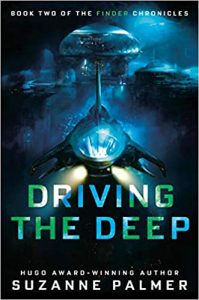 So this is an out-of-the-frying-pan into the lava-filled volcano story that rides on the semi-controlled insanity of its protagonist and the circle of amazing people that have been drawn into his chaotic orbit.
So this is an out-of-the-frying-pan into the lava-filled volcano story that rides on the semi-controlled insanity of its protagonist and the circle of amazing people that have been drawn into his chaotic orbit.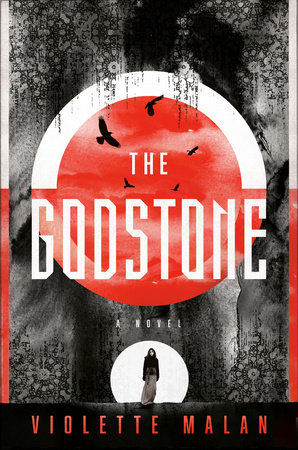 The Godstone by
The Godstone by 
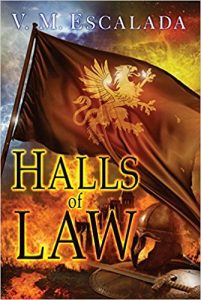 The story at first seems straightforward enough, in a sense, because it’s obvious to Arlyn from the very beginning that there are some seriously screwy political shenanigans going on in the capital that someone wants to entangle him in. So even though the political shenanigans themselves are more convoluted and dangerous than first appears – because of course they are – that initial framework itself is easy to understand.
The story at first seems straightforward enough, in a sense, because it’s obvious to Arlyn from the very beginning that there are some seriously screwy political shenanigans going on in the capital that someone wants to entangle him in. So even though the political shenanigans themselves are more convoluted and dangerous than first appears – because of course they are – that initial framework itself is easy to understand.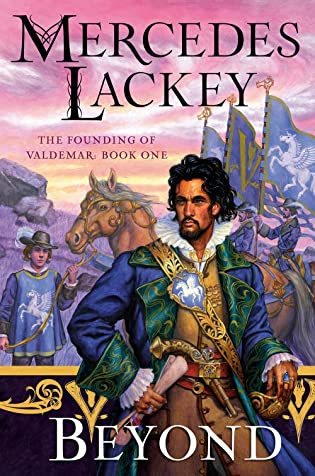 Beyond (The Founding of Valdemar #1) by
Beyond (The Founding of Valdemar #1) by